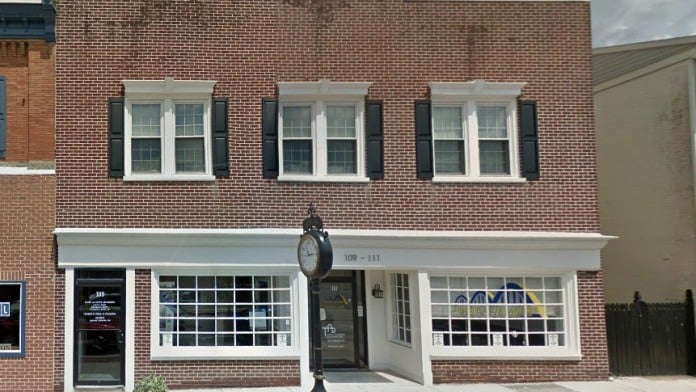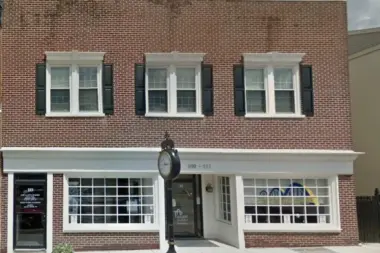I had a great experience, they are there to help and hope anyone who goes there finds the help, freindly, understanding, professional staff.
About Project Chesapeake
Project Chesapeake is a leading substance use recovery and mental health network in Maryland with 24 locations statewide including one in Elkton. Their recovery focused strategies promote lasting healing and sustained success that strengthen communities. Services at each location are provided by skilled and compassionate experts who offer tailored solutions for holistic healing. They’re CARF accredited and serve both adults and adolescents in recovery.
Project Chesapeake in Elkton is located on East Main Street in downtown Elkton. The facility also serves Newark via Elkton Road and Wilmington via Interstate 95. Both of these nearby cities are in Delaware. Folks from Baltimore also access care here.
Flexible Support for Lasting Recovery
Project Chesapeake’s outpatient program in Elkton helps adults and adolescents overcome substance use and mental health challenges via tailored therapeutic support. The program is particularly suitable if you’ve got a strong support network and seek flexible treatment for moderate to mild symptoms while living at your residence.
They offer both traditional outpatient and intensive outpatient programs for adults and adolescents in recovery. You’ll undergo a detailed intake assessment to help the care team determine what level of care will best suit your recovery needs.
They offer morning and evening sessions to fit your schedule so that you can maintain your family and work obligations while receiving care. The programs may also support people with co-occurring disorders using an integrated care model to take care of both addiction symptoms and mental health issues at the same time. This approach involves psychiatric care, including assessment and medication management alongside addiction therapy.
Project Chesapeake in Elkton also provides anger management and domestic violence classes that satisfy court-ordered requirements. This can be essential because anger or stress and domestic violence may lead to or result from substance use disorder. They also offer DUI/DWI education that helps offenders understand the risks of substance use and develop safer decision-making skills.
Facility Overview
Latest Reviews
Rehab Score
Gallery


Other Forms of Payment
Private insurance refers to any kind of healthcare coverage that isn't from the state or federal government. This includes individual and family plans offered by an employer or purchased from the Insurance Marketplace. Every plan will have different requirements and out of pocket costs so be sure to get the full details before you start treatment.
Self-pay involves paying for treatment out of your own pocket. You can use savings or credit, get a personal loan, or receive help from family and friends to fund your treatment. If you don't have insurance or your insurance plan doesn't cover a specific program, self-pay can help ensure you still get the care you need.
Financial aid can take many forms. Centers may have grants or scholarships available to clients who meet eligibility requirements. Programs that receive SAMHSA grants may have financial aid available for those who need treatment as well. Grants and scholarships can help you pai for treatment without having to repay.
Medicaid is a state based program that helps lower-income individuals and families pay for healthcare. Medicaid covers addiction treatment so those enrolled can use their coverage to pay for rehab. When a program accepts Medicaid the client often pays very little or nothing out of their own pocket.
Medicare is a federal program that provides health insurance for those 65 and older. It also serves people under 65 with chronic and disabling health challenges. To use Medicare for addiction treatment you need to find a program that accepts Medicare and is in network with your plan. Out of pocket costs and preauthorization requirements vary, so always check with your provider.
Addiction Treatments
Levels of Care
This program focuses on education, self-diagnosis, defense mechanisms, development of a sober support network, and relapse prevention. The series typically runs for 26 weeks (if clinically appropriate) for adults who have experienced some negative consequences from their substance abuse. As a cornerstone of Project Chesapeake’s overall mission, they’re proud to offer this service to adults in need. Participation requires specific individualized treatment plan objectives be met prior to discharge.
In some cases, traditional outpatient care is not appropriate for individuals with more severe chemical dependency problems. When this is the case, they offer their Intensive Outpatient program, their most intense level of outpatient counseling. This service is a unique combination of group and individual counseling lasting a total of nine or more hours per week. Intensive Outpatient works to stabilize the client and to begin teaching the tools of recovery. In order to better accommodate the needs of the client, Intensive Outpatient groups are offered in the morning and the evening. This allows the client to access treatment while still maintaining family and work schedules and meeting obligations that solidify behavior change, thus breaking the cycle of substance abuse.
Inpatient rehab enables clients to focus exclusively on their recovery while living in a highly structured and supportive environment. Inpatient treatment is typically designed for clients who have just completed detox, are in early recovery, and/or are at an elevated risk of relapse. Their treatment generally involves intensive addiction counseling, including individual, group, and family counseling. Many inpatient rehabs also offer recovery-focused life skills training and/or holistic therapies, such as yoga, massage, and meditation.
Treatments
The goal of treatment for alcoholism is abstinence. Those with poor social support, poor motivation, or psychiatric disorders tend to relapse within a few years of treatment. For these people, success is measured by longer periods of abstinence, reduced use of alcohol, better health, and improved social functioning. Recovery and Maintenance are usually based on 12 step programs and AA meetings.
Once a person has become addicted to a substance, drug rehab in Maryland is often necessary to overcome that addiction. These programs provide the tools individuals need to manage the physical, mental, and emotional issues involved and begin a successful recovery journey.
A combined mental health and substance abuse rehab has the staff and resources available to handle individuals with both mental health and substance abuse issues. It can be challenging to determine where a specific symptom stems from (a mental health issue or an issue related to substance abuse), so mental health and substance abuse professionals are helpful in detangling symptoms and keeping treatment on track.
In Maryland, substance abuse treatment programs support individuals struggling with drugs or alcohol, and those who also have mental health conditions. These rehab programs vary, depending on the level of care you need. That might include inpatient rehab, or an outpatient program. Typically, substance abuse treatment includes evidence-based therapies such as cognitive-behavioral therapy (CBT), dialectical behavior therapy (DBT), recovery support meetings, and skills groups to equip you with new coping strategies when you leave rehab.
Treatment for drug and alcohol addiction often centers on improving mental health. Inpatient care is ideal for people who need closer monitoring while receiving therapeutic and mental health services. Standard therapies include group and individual counseling, relapse prevention education, coping skills training, cognitive-behavioral therapy (CBT), motivational interviewing and family support groups. With all critical therapies combined, there is a greater chance for improving mental health and achieving sustained recovery.
Programs
Adult rehab programs include therapies tailored to each client's specific needs, goals, and recovery progress. They are tailored to the specific challenges adult clients may face, including family and work pressures and commitments. From inpatient and residential treatment to various levels of outpatient services, there are many options available. Some facilities also help adults work through co-occurring conditions, like anxiety, that can accompany addiction.
Young adulthood can be an exciting, yet difficult, time of transition. Individuals in their late teens to mid-20s face unique stressors related to school, jobs, families, and social circles, which can lead to a rise in substance use. Rehab centers with dedicated young adult programs will include activities and amenities that cater to this age group, with an emphasis on specialized counseling, peer socialization, and ongoing aftercare.
Teen programs are designed to address the unique pressures teens face, pressures that can drive them to experiment with dangerous, addictive substances. They need programs that meet them exactly where they are and give them tools for long-term recovery. Therapy can help teenagers understand and work through underlying issues so they can reclaim the life ahead of them.
Clinical Services
Cognitive Behavioral Therapy (CBT) is a therapy modality that focuses on the relationship between one's thoughts, feelings, and behaviors. It is used to establish and allow for healthy responses to thoughts and feelings (instead of unhealthy responses, like using drugs or alcohol). CBT has been proven effective for recovering addicts of all kinds, and is used to strengthen a patient's own self-awareness and ability to self-regulate. CBT allows individuals to monitor their own emotional state, become more adept at communicating with others, and manage stress without needing to engage in substance abuse.
Group therapy is any therapeutic work that happens in a group (not one-on-one). There are a number of different group therapy modalities, including support groups, experiential therapy, psycho-education, and more. Group therapy involves treatment as well as processing interaction between group members.
This is a process through which clients work one-on-one with a trained counselor, in a safe, caring, and confidential environment to explore their feelings, beliefs, or behaviors, work through challenging or influential memories, identify aspects of their lives that they would like to change, better understand themselves and others, set personal goals, and work toward desired change. People seek counseling for a wide variety of reasons, from coping with major life challenges or childhood trauma, to dealing with substance abuse and simply desiring personal growth and greater self-knowledge.
During dialectical behavior therapy sessions, you'll review the challenges you faced the previous week and the feelings you experienced during those times. You and your therapist will engage in problem solving, discussing how you can handle those situations in the future for a better outcome. This involves keeping a diary throughout the week to track your emotions.
Amenities
-
Residential Setting
Accreditations

The Commission on Accreditation of Rehabilitation Facilities (CARF) is a non-profit organization that specifically accredits rehab organizations. Founded in 1966, CARF's, mission is to help service providers like rehab facilities maintain high standards of care.
CARF Accreditation: Yes

State Licenses are permits issued by government agencies that allow rehab organizations to conduct business legally within a certain geographical area. Typically, the kind of program a rehab facility offers, along with its physical location, determines which licenses are required to operate legally.
State License: Maryland
Contact Information
111 East Main Street
Suite B
Elkton, MD 21921